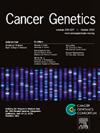15.内部分子检测对阿拉巴马州南部服务不足的癌症患者的临床影响
IF 1.4
4区 医学
Q4 GENETICS & HEREDITY
引用次数: 0
摘要
分子分析对于确定癌症靶向治疗的基因组突变至关重要。我们评估了内部单基因突变检测对转移性黑色素瘤 BRAF V600、结直肠癌微卫星不稳定性 (MSI) 和慢性骨髓性白血病定量 BCR::ABL1 p210 的临床影响。我们测定了检测结果的周转时间(TAT)、QNS 和标本排斥率。BRAF V600 检测共有 63 例,其中 43 例(68%)为 BRAF 野生型,20 例(32%)为 BRAF 突变型,0 例(0%)为 QNS 和标本排斥,TAT 为 24 小时。在 MSI 检测中,共有 100 个病例,其中 91 例(91%)为 MSI 稳定型,9 例(9%)为 MSI 高型,0 例(0%)为 QNS 和标本排斥,TAT 为 24 小时。p210定量检测共有185例,其中126例(68%)检测到p210,59例(32%)未检测到p210,10例(5.4%)因分析前误差而被拒收,24小时TAT。就 BRAF 和 MSI 检测而言,内部检测的 QNS 和样本拒收率为 0%,而外送检测的 QNS 和样本拒收率为 12.5%。对于 BCR::ABL1 p210 定量检测,内部检测的排斥率为 5.4%,而外送检测的排斥率为 20%。所有内部检测的 TAT 为 24 小时,而外送检测为 7 天。更快的TAT、成本效益和更好的检测管理是本地检测的主要优势,这将使服务不足的癌症患者能够更广泛地获得精准治疗。本文章由计算机程序翻译,如有差异,请以英文原文为准。
15. Clinical impact of in-house molecular testing for underserved cancer patients in southern Alabama
Molecular profiling is critical in identifying genomic mutations for targeted cancer therapy. This study assesses the outcome of in-house molecular testing at a healthcare organization that cares for underserved population in southern Alabama.
We assessed the clinical impact of in-house single-gene mutation assays for BRAF V600 for metastatic melanoma, microsatellite instability (MSI) for colorectal carcinoma, and quantitative BCR::ABL1 p210 for chronic myelogenous leukemia. We determined test result turnaround time (TAT), and QNS and specimen rejection rate.
For BRAF V600 assay, there were 63 cases with 43 (68%) BRAF wild type, 20 (32%) BRAF mutant, 0 (0%) QNS and specimen rejection, and <24 hours TAT. For MSI assay, there were 100 cases with 91 (91%) MSI-Stable, 9 (9%) MSI-High, 0 (0%) QNS and specimen rejection, and <24 hours TAT. For quantitative p210 assay, there were 185 cases with 126 (68%) p210 detected, 59 (32%) p210 not detected, 10 (5.4%) cases were rejected due to pre-analytical errors, and <24 hours TAT. For BRAF and MSI assays, QNS and specimen rejection rate was 0% for in-house testing vs. 12.5% for send-out. For quantitative BCR::ABL1 p210 assay, the rate was 5.4% for in-house testing vs. 20% for send-out. The TAT for all in-house assays was <24 hours vs. >7 days for send-outs.
In-house molecular testing has significant positive clinical impact. Faster TAT, cost effectiveness and better management of testing are major advantages of local testing that would enable broader access to precision therapy for underserved cancer patients.
求助全文
通过发布文献求助,成功后即可免费获取论文全文。
去求助
来源期刊

Cancer Genetics
ONCOLOGY-GENETICS & HEREDITY
CiteScore
3.20
自引率
5.30%
发文量
167
审稿时长
27 days
期刊介绍:
The aim of Cancer Genetics is to publish high quality scientific papers on the cellular, genetic and molecular aspects of cancer, including cancer predisposition and clinical diagnostic applications. Specific areas of interest include descriptions of new chromosomal, molecular or epigenetic alterations in benign and malignant diseases; novel laboratory approaches for identification and characterization of chromosomal rearrangements or genomic alterations in cancer cells; correlation of genetic changes with pathology and clinical presentation; and the molecular genetics of cancer predisposition. To reach a basic science and clinical multidisciplinary audience, we welcome original full-length articles, reviews, meeting summaries, brief reports, and letters to the editor.
 求助内容:
求助内容: 应助结果提醒方式:
应助结果提醒方式:


